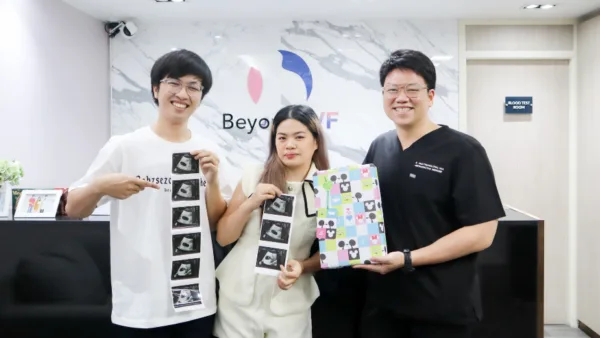This client was 35 years old and had one child. They tried for five years to conceive their second, but as they got older, their attempts were unsuccessful. So they decided to undergo ICSI treatment four times overseas, but they still couldn’t get pregnant.
In their first and second ICSI attempts, the embryo only made it to the third day and then were transferred. In the third and fourth attempts, the embryos made it to the fifth day and were transferred without any chromosomal testing, which may be why the transfer was unsuccessful.
With so many failed attempts, the client decided to change their place of treatment. They began looking online for successful cases in a similar age group and found Dr. Ton at Beyond IVF, an expert in treating infertility in older people. Dr. Ton is also well known in Thailand. The client looked further into it and was impressed by Dr. Ton so decided to fly to Thailand to meet him specifically. They wanted to start treatment as soon as possible. Fortunately the client saw Dr. Ton during her cycle. Dr. Ton asked for a health assessment to design an appropriate treatment plan. The client asked to do ICSI again as they wanted to be pregnant as quickly as possible.
Dr. Ton informed the client that if they would like to undergo ICSI again, embryos must be tested with NGS to assess their quality before transfer into the uterus to increase the chances of a successful pregnant. The client agreed and began ovarian stimulation immediately after their discussion with Dr. Ton. After completing the ovarian stimulation regimen, only 7 eggs measured 18-20 mm. Even though the client did not have many eggs, the good news was that five embryos made it to the blastocyst stage. The embryos were sent for NGS so the doctor would have all the information needed to try and avoid past treatment failures.
After NGS two embryos were found to be normal. The client was surprised by how few embryos passed the chromosomal screening. Dr. Ton recommended that both embryos be transferred with the hopes that one would implant in response to the client’s hormones and lead to a successful pregnancy. The client agreed to have both embryos transferred, feeling they had nothing to lose at this point, and that this treatment might be their last. The client began taking medication to prepare the uterine lining, which responded well to medication and was ideal for transfer of embryos.
After the embryo transfer Dr. Ton asked the client to come in to have their hormones checked every three days as well as adjusted their hormone injections each time in response to any imbalances (a technique specific to Beyond IVF) to encourage successful implantation. The client was impressed by this special technique at Beyond IVF since they had never encountered such close follow-up previously.
Eighteen days after the transfer Dr. Ton schedule the client for an ultrasound to check for yolk sacs. It turned out that two yolk sacs were found! Both embryos had implanted and so there were twins.
Treatment: ICSI
Additional Techniques: Intracytoplasmic sperm injection (ICSI) and next-generation sequencing (NGS)
Client’s Review: I am so impressed by the care and treatment of Dr. Ton. Beyond IVF helped us add two new members to our family; what a special gift.


